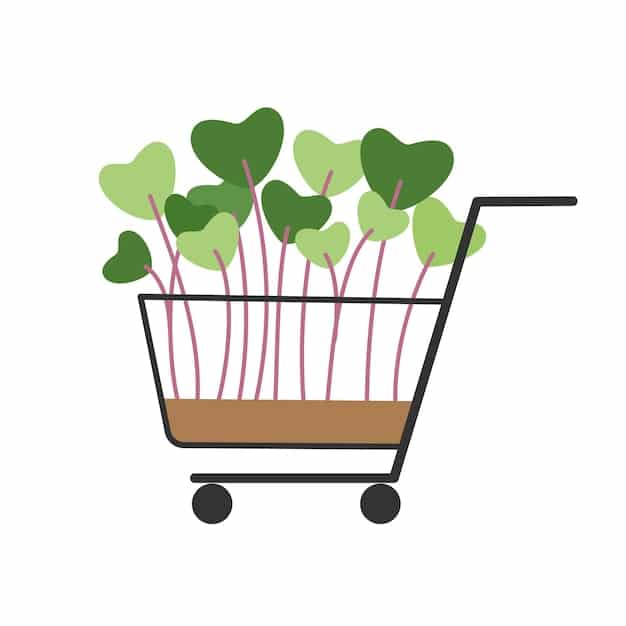Browser Extensions for Ethical Shopping: Find Sustainable & Fair-Trade Products

Browser extensions for ethical shopping empower consumers to effortlessly identify sustainable and fair-trade products, integrating transparency directly into their online retail experience by providing instant information on environmental impact, labor practices, and company ethics as they browse.
In an increasingly conscious world, consumers are seeking ways to align their purchasing power with their values. This desire for responsible consumption has led to a growing interest in sustainable and fair-trade products, but navigating the vast landscape of online shopping to find truly ethical options can be daunting. Thankfully, a new generation of tools is emerging to simplify this process: browser extensions for ethical shopping: find sustainable and fair-trade products with unprecedented ease, bringing transparency directly to your browser.
The Rise of Conscious Consumerism
The global shift towards conscious consumerism is more than a trend; it’s a fundamental change in how individuals interact with the marketplace. This movement is driven by an awareness of the profound impact purchasing decisions have on the planet, communities, and future generations. Consumers are no longer satisfied with merely acquiring goods; they demand to know the story behind them, from raw materials to manufacturing processes and labor conditions.
This heightened scrutiny stems from a confluence of factors, including increased media coverage of environmental degradation, social injustices in supply chains, and a general awakening to corporate responsibility. Social media platforms have further amplified this awareness, allowing individuals to share information and hold brands accountable like never before.
However, the sheer volume of information, and misinformation, available online can be overwhelming. Distinguishing genuinely ethical brands from those engaged in “greenwashing” or “fairwashing” requires significant time and effort. This complexity often acts as a barrier, preventing well-intentioned consumers from making choices that truly reflect their values.
Navigating these complexities necessitates tools that can cut through the noise, providing verified, digestible information at the point of decision. This is where the innovation of technology, specifically in the form of browser extensions, offers a powerful solution.
Understanding Supply Chain Ethics
At the core of conscious consumerism lies the understanding of supply chain ethics. This encompasses every stage of a product’s journey, from the sourcing of raw materials to the manufacturing, distribution, and even disposal. Ethical concerns within supply chains are diverse and complex, touching upon environmental stewardship, labor practices, and animal welfare.
- Environmental Impact: This includes carbon footprint, water usage, waste generation, pollution, and the use of harmful chemicals.
- Labor Practices: Fair wages, safe working conditions, absence of child labor or forced labor, and the right to collective bargaining.
- Animal Welfare: Ethical treatment of animals in industries like fashion (leather, fur, wool) and food production.
Traditional manufacturing models often prioritize cost-efficiency over ethical considerations, leading to opaque supply chains where exploitation and environmental damage can be hidden. Modern consumers are increasingly demanding transparency, seeking to support brands that demonstrate a genuine commitment to responsible practices.
Moreover, the concept of a circular economy is gaining traction, emphasizing products designed for durability, repair, and recyclability, thereby minimizing waste and maximizing resource efficiency. Ethical consumption extends beyond the initial purchase, considering the entire lifecycle of a product.
Without readily accessible information, consumers face a significant challenge in verifying these claims. The market is saturated with products, and marketing narratives can often be misleading. Tools that can instantly present verified data points become indispensable for effective ethical shopping.
The Challenge of Greenwashing
Greenwashing is a deceptive marketing practice where a company or organization presents itself as environmentally friendly or sustainable when, in reality, its actions are not. This can involve making vague or unsubstantiated claims, selectively disclosing information, or even outright lying about environmental performance. The rise of conscious consumerism has unfortunately led to a corresponding increase in companies attempting to capitalize on this trend without genuine commitment.
Identifying greenwashing can be difficult for the average consumer. Companies often use evocative language, imagery, and certifications that appear legitimate but lack substance. Examples include products labeled “all-natural” when they contain synthetic ingredients, or claims of “eco-friendly” production without substantiating data.
- Vague Language: Terms like “eco-friendly,” “natural,” or “sustainable” without specific details or certifications.
- Misleading Packaging: Use of green colors, leaves, or nature imagery on packaging for products that are not environmentally sound.
- Hidden Trade-offs: Highlighting one small eco-friendly aspect while ignoring larger negative environmental impacts.
The presence of greenwashing underscores the need for third-party verification and unbiased information. Consumers require tools that can go beyond marketing claims and evaluate a product’s true environmental and social footprint. Browser extensions can play a crucial role by cross-referencing product information with independent databases and rating systems, providing an objective assessment that consumers can trust.
This verification process helps cut through the marketing noise, empowering consumers to make truly informed decisions and hold companies accountable for their environmental and social claims. It shifts the power dynamic, giving individuals the ability to demand genuine commitment to sustainability and fair practices.

How Browser Extensions Facilitate Ethical Shopping
Browser extensions represent a significant leap forward in empowering ethical consumers. By integrating directly into web browsers, these tools provide real-time information as users shop online, transforming a passive browsing experience into an active, informed decision-making process. The convenience factor is paramount; instead of having to research each product or brand separately, the information is delivered directly to the user’s screen.
These extensions typically work by detecting products on e-commerce sites and cross-referencing them with databases of ethical ratings, certifications, and company profiles. This backend data often comes from independent organizations specializing in environmental impact, labor rights, and social responsibility. Some extensions also allow users to set preferences or receive alerts when a product aligns with their specific values, whether that’s avoiding animal testing, supporting fair trade, or reducing carbon emissions.
Beyond simple ratings, many extensions offer detailed breakdowns of a product’s score, explaining the criteria used and highlighting specific areas of concern or excellence. This granular data allows consumers to understand the nuances of a product’s ethical footprint, rather than just a simplistic “good” or “bad” label. For instance, an extension might show a product’s footprint regarding water usage or its labor practices within its supply chain.
The integration of these tools into the browsing experience effectively democratizes access to critical ethical information, making it available to a wider audience without requiring extensive prior knowledge or research. This immediate feedback loop fosters a greater sense of responsibility and can significantly influence purchasing habits, steering demand towards more ethical producers.
Real-Time Data Integration
The power of ethical shopping browser extensions lies in their ability to perform real-time data integration. As a user navigates an online store, the extension works in the background, analyzing the product details displayed on the page. It then queries its internal databases or external APIs (Application Programming Interfaces) from trusted third-party ethical rating organizations.
- Instant Insights: Overlays or pop-ups appear directly on the product page, showing ethical scores, red flags, or green certifications related to sustainability, fair labor, or other criteria.
- Comprehensive Data Points: Information can include carbon footprint estimations, water usage statistics, details on sourcing of materials, and labor conditions in manufacturing facilities.
- Cross-Referencing: Many extensions cross-reference data from multiple sources to provide a more robust and verified assessment, reducing the risk of relying on a single, potentially biased, source.
This seamless process eliminates the need for manual research, which often involves opening multiple tabs, searching for scattered information, and trying to piece together a coherent picture. The immediate availability of information transforms the shopping experience from a hunt for ethical products into an effortless discovery process, allowing consumers to make quick, informed decisions based on their values.
The efficiency of real-time data integration means that ethical considerations become an intrinsic part of the shopping journey, rather than an added burden. It empowers consumers by consolidating complex information into actionable insights, helping them identify truly sustainable and fair-trade options at the moment of purchase.
Decoding Certifications and Labels
The vast array of certifications and labels in the marketplace can be a source of confusion for even the most diligent ethical shopper. From “Organic” and “Fair Trade Certified” to “FSC” (Forest Stewardship Council) and “B Corp,” each label represents a specific set of standards and verification processes. Understanding what each certification truly signifies is crucial for making informed choices.
Browser extensions often act as a decoder for these labels. When a product displays a specific certification, the extension can provide immediate context, explaining what the certification means, the criteria it covers, and its credibility. This prevents consumers from being misled by lesser-known or self-proclaimed certifications that lack rigorous third-party verification.
- Certification Explanations: Brief, clear descriptions of common ethical and environmental certifications, including their scope and significance.
- Credibility Ratings: Some extensions might even rate the credibility and rigor of different certification bodies, helping users distinguish between legitimate and less meaningful labels.
- Direct Links to Standards: Providing links to the official websites of certification bodies for users who wish to delve deeper into the specific standards.
Deciphering certifications and labels is vital for avoiding greenwashing, as many companies use misleading or vague terms that resemble official certifications. By providing instant verification and explanation, these extensions empower consumers to confidently identify products that genuinely meet high ethical and sustainability standards, reinforcing the integrity of the ethical marketplace.
Key Features to Look for in Ethical Shopping Extensions
Choosing the right ethical shopping browser extension involves understanding the features that best align with your personal values and shopping habits. While many extensions share common functionalities, their strengths lie in diverse areas, from broad ethical scorings to niche focuses on specific product categories or sustainability metrics. A robust extension should offer a balance of comprehensive data, user-friendliness, and transparency in its methodology.
Ideally, an extension should provide more than just a red or green light. It should offer granular data that allows you to understand *why* a product or brand received a particular rating. This level of detail empowers you to make nuanced decisions, even if a product isn’t perfectly ethical across all metrics but excels in areas most important to you.
Furthermore, an excellent ethical shopping extension should be regularly updated, as company practices and supply chain information can change. Data accuracy and timeliness are critical for providing reliable insights to consumers. Look for extensions that are transparent about their data sources and methodologies, ensuring you can trust the information provided.
Comprehensive Ethical Scoring
A leading feature of any ethical shopping extension is its ability to provide comprehensive ethical scoring. This goes beyond a simple “good” or “bad” rating, encompassing multiple dimensions of a product’s or brand’s impact. These dimensions typically include environmental sustainability, labor practices, animal welfare, and community impact.
- Multi-Factor Analysis: Evaluates products based on various criteria such as carbon emissions, water usage, waste production, fair wages, working conditions, and ethical sourcing of materials.
- Granular Breakdowns: Provides detailed scores or color-coded indicators for each ethical category, allowing users to see where a product excels or falls short.
- Brand-Level & Product-Level Data: Some extensions offer both an overall brand ethical rating and specific product-level assessments where data is available, which is particularly useful for diversified companies.
The depth of the ethical scoring system directly correlates with its utility. A nuanced system allows consumers to prioritize their values. For instance, someone prioritizing low carbon footprint might accept a slightly lower labor score, while another might prioritize fair wages above all else. This feature enables personalized ethical shopping.
A transparent methodology behind the scoring is also crucial. Reputable extensions will typically explain their data sources, how scores are calculated, and who their partners are for data collection and verification, fostering trust and credibility with their user base.
Supply Chain Transparency
Supply chain transparency is a growing demand from ethical consumers, and a key feature in effective browser extensions. This refers to the ability to track and verify the origins of materials and the conditions under which products are manufactured. Historically, supply chains have been notoriously opaque, making it difficult to identify unethical practices.
A valuable ethical shopping extension provides insights into a brand’s supply chain, allowing users to see how far a company goes in ensuring ethical sourcing and production. This can include information on:
- Raw Material Origins: Where ingredients, textiles, or minerals are sourced from, and whether they come from conflict zones or unsustainable practices.
- Manufacturing Facilities: Details about the factories where products are made, including labor conditions, fair wages, and safety standards.
- Certifications & Audits: Information on third-party audits and certifications that verify ethical practices throughout the supply chain.
By bringing this information to the forefront, extensions help consumers understand the journey of their products. This level of detail empowers them to support companies that have invested in creating verifiable, ethical supply chains, and to hold others accountable for their lack of transparency.
Tools that highlight supply chain transparency can be particularly impactful in industries prone to exploitation, such as fashion, electronics, and agriculture. They transform the act of shopping into an investigative process, where consumers become active participants in demanding greater corporate accountability.
Top Browser Extensions for Ethical Shopping in 2025
As the market for ethical consumption grows, so too does the ecosystem of tools designed to support it. In 2025, several browser extensions stand out for their comprehensive features, reliable data, and ease of use. These tools are continuously evolving, integrating new data sources and refining their algorithms to provide the most accurate and up-to-date information for conscious shoppers.
These extensions are not just about avoiding “bad” brands; they are increasingly focused on highlighting and celebrating “good” brands that are making genuine efforts in sustainability and ethical practices. This positive reinforcement encourages both consumers and businesses to adopt more responsible approaches. When selecting an extension, it’s beneficial to try a few to see which integrates best with your browsing habits and offers the type of ethical information most relevant to your personal values.
The landscape of ethical data is complex, and no single extension can capture every nuance. However, the leaders in this space are those that prioritize transparency in their methodologies, regularly update their data, and source their information from credible, independent bodies. They are also those that adapt to new ethical challenges and emerging sustainability standards.
Econable: Your Eco-Assistant
Econable is rapidly gaining traction as a powerful eco-assistant for online shoppers. This extension aims to make sustainable shopping effortless by providing instant insights into the environmental impact of products as you browse e-commerce sites. Its strength lies in its focus on carbon footprint and other key environmental metrics.
Econable works by analyzing product descriptions and ingredient lists, cross-referencing them with its extensive database of environmental data. It attempts to estimative a product’s carbon footprint and flags ingredients or materials known for their negative environmental impact. This is particularly useful for categories like clothing, electronics, and home goods where material sourcing and manufacturing processes have significant environmental implications.
- Carbon Footprint Estimations: Provides an estimated carbon impact score for many products.
- Material Breakdown: Identifies and explains the environmental impact of different materials (e.g., polyester vs. organic cotton).
- Sustainable Alternatives: Suggests more sustainable alternatives or brands when browsing less eco-friendly options.
The extension’s direct integration with popular shopping platforms ensures that environmental considerations are front and center without disrupting the shopping flow. Econable’s goal is to empower consumers to easily identify products that contribute positively to environmental sustainability, making it a valuable tool for anyone looking to reduce their ecological footprint through their purchasing habits.
Its user interface is typically intuitive, offering clear visual cues that instantly communicate a product’s eco-credentials. By simplifying complex environmental data, Econable helps transform theoretical knowledge about sustainability into practical, actionable shopping decisions.
DoneGood: Shop Your Values
DoneGood is an extension designed to help consumers “shop their values” by identifying brands committed to social good and environmental sustainability. Unlike some tools that focus narrowly on environmental metrics, DoneGood takes a broader approach, evaluating companies based on a wide range of ethical criteria, including fair wages, safe working conditions, environmental sustainability, and community impact.
When you’re browsing on a regular shopping site, DoneGood pops up with a notification if a more ethical alternative to the product you’re viewing is available, or if the brand you are currently seeing aligns with ethical standards. It highlights businesses that pay a living wage, offer good benefits, practice environmental sustainability, support artisans, and donate a portion of their profits to charitable causes.
- Ethical Brand Discovery: Recommends ethical brands that align with your values across various product categories.
- Impact Categories: Clearly indicates which ethical impact categories a brand supports (e.g., “Fair Wages,” “Eco-Friendly,” “Cruelty-Free”).
- Discount Codes: Collaborates with ethical brands to offer exclusive discounts, making ethical shopping more accessible.
DoneGood aims to make it as easy as possible for consumers to shift their spending towards businesses that are doing good in the world. By providing direct links to ethical alternatives and even offering discounts, it removes common barriers to conscious consumption. Its focus on overall brand ethics makes it particularly useful for consumers who want to support companies with a holistic commitment to social and environmental responsibility, rather than just single-product certifications.
The extension streamlines the process of finding businesses that align with a comprehensive set of ethical principles, encouraging a more responsible and impactful consumer behavior.

The Impact of Ethical Shopping Extensions on Consumer Behavior
The advent of ethical shopping browser extensions is not merely a convenience; it represents a significant shift in consumer behavior and market dynamics. By providing instant, actionable information, these tools empower individuals to move beyond intentions and actively translate their values into purchasing decisions. This newfound transparency has far-reaching implications, fostering a more informed and demanding consumer base.
When ethical considerations are seamlessly integrated into the shopping experience, they become less of an afterthought and more of an intrinsic part of the decision-making process. Consumers are no longer reliant on dense reports or extensive research; the information is presented in a digestible format at the very moment they are considering a purchase. This reduces the friction associated with ethical shopping and accelerates the adoption of more responsible consumption habits.
Furthermore, the collective impact of millions of informed purchasing decisions can send powerful signals to the market. As demand shifts towards ethical goods, companies are incentivized to review and improve their own practices, ensuring their supply chains are transparent and their environmental footprints are minimized. This creates a virtuous cycle where consumer demand drives corporate responsibility, leading to a more sustainable and equitable marketplace for all.
Shifting Purchasing Habits
One of the most profound impacts of ethical shopping extensions is their ability to actively shift purchasing habits. By flagging problematic products and highlighting ethical alternatives, these tools directly influence what consumers choose to buy. This immediate feedback loop can lead to a significant reallocation of spending towards brands that align with ethical principles.
- Informed Decision-Making: Consumers are better equipped to consider ethical implications alongside price and quality, leading to more holistic purchasing decisions.
- Reduced “Choice Paralysis”: By simplifying complex ethical data, extensions make it easier for consumers to choose, rather than becoming overwhelmed by options.
- Brand Accountability: As consumers vote with their wallets, brands are compelled to improve their ethical practices to retain market share and meet growing demand.
The ease with which ethical information is accessed means that impulse purchases can become more conscious. A consumer might be about to buy a product but, upon seeing a red flag from an extension, reconsider and look for a more sustainable option. This constant, gentle nudge towards ethical choices can create lasting changes in individual behavior.
Over time, these individual shifts accumulate into significant market trends, demonstrating to businesses that ethical performance is not just a nice-to-have but a critical factor in consumer loyalty and sales. This pressure from the demand side plays an essential role in driving broader industry-wide improvements in sustainability and fair practices.
Driving Corporate Accountability
The increased transparency facilitated by ethical shopping extensions acts as a powerful mechanism for driving corporate accountability. When consumers can easily scrutinize a company’s ethical performance, there is immense pressure for brands to clean up their act. Companies that previously operated with opaque supply chains or questionable labor practices now risk being exposed and losing market share.
The real-time data provided by these extensions means that negative ethical ratings can immediately impact sales. Conversely, positive ratings and certifications can boost a brand’s reputation and attract conscientious buyers. This direct link between ethical performance and financial success creates a strong incentive for companies to invest in sustainable sourcing, fair labor, and transparent operations.
- Exposure of Unethical Practices: Extensions can quickly highlight brands involved in greenwashing, unfair labor practices, or environmental damage.
- Incentive for Improvement: Companies realize that ethical performance is a new competitive advantage, leading them to proactively address supply chain issues and sustainability goals.
- Supply Chain Pressure: Large brands, facing consumer pressure, will in turn demand higher ethical standards from their suppliers, creating a ripple effect throughout global supply chains.
Furthermore, the aggregated data from these extensions can provide insights into industry-wide ethical shortcomings, spurring advocacy groups and regulatory bodies to take action. The collective knowledge of millions of consumers, amplified by these tools, transforms individual purchasing power into a formidable force for positive change within the corporate world. This fosters an environment where ethical considerations are not just aspirational but integral to business strategy and success.
| Key Benefit | Brief Description |
|---|---|
| 🛒 Instant Transparency | Get immediate ethical and sustainability ratings as you shop online, saving research time. |
| 🌱 Eco-Sensitive Choices | Effortlessly identify products with lower environmental impact and sustainable sourcing. |
| 🤝 Fair Trade Support | Discover and support brands committed to fair labor practices and ethical supply chains. |
| 🔍 Combat Greenwashing | Tools help verify claims and expose misleading marketing, ensuring genuine ethical purchases. |
Frequently Asked Questions
▼
Ethical shopping browser extensions are small software programs that you install in your web browser. They actively scan product pages on e-commerce websites and provide immediate information about a product’s or brand’s ethical and environmental performance, such as sustainability ratings, labor practices, and fair trade certifications, right as you shop.
▼
These extensions typically integrate with, or draw data from, large databases compiled by independent ethical rating organizations, NGOs, and certification bodies. They cross-reference product and brand information with verified data points on social responsibility, environmental impact, supply chain transparency, and other ethical criteria to deliver insights to the user.
▼
Yes, significantly. Greenwashing involves companies making misleading claims about their environmental or ethical practices. Extensions often provide objective, third-party verified data that can expose unsubstantiated claims and highlight genuine ethical efforts, helping consumers distinguish between truly sustainable products and those merely using marketing spin.
▼
As with any browser extension, it’s crucial to review the privacy policy of ethical shopping tools. Reputable extensions focus on analyzing product pages and generally do not track your personal browsing history extensively. Always download extensions from official browser stores and check user reviews for any reported privacy issues to ensure minimal data collection.
▼
Most ethical shopping extensions cover a broad range of issues. These include environmental impact (e.g., carbon footprint, water use, waste), labor practices (e.g., fair wages, child labor, safe conditions), animal welfare (e.g., cruelty-free, vegan options), and broader social responsibility (e.g., community involvement, charitable giving, transparency).
Conclusion
The journey towards a more sustainable and equitable marketplace is multifaceted, driven by both corporate responsibility and evolving consumer demand. Browser extensions for ethical shopping stand as pivotal tools in this landscape, bridging the gap between intention and action. By embedding critical ethical and sustainability insights directly into the online shopping experience, they empower everyday consumers to make informed choices with unprecedented ease. This not only cultivates a more conscious consumer base but also exerts significant pressure on companies to adopt more transparent, fair, and environmentally sound practices. As these tools continue to evolve, they promise to further democratize access to vital information, making ethical shopping less of a specialized pursuit and more of a mainstream norm.





